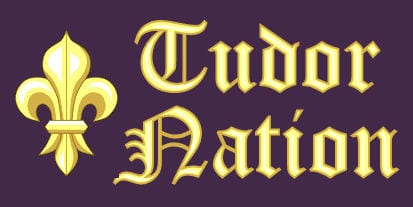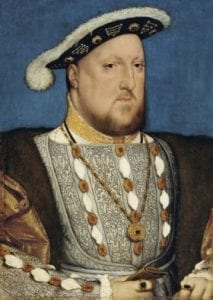A detailed chronology of the main events that happened in 1512 during the reign of King Henry VIII, showing dates, events and details
Events are coded:
Births, Baptisms, Marriages and Deaths
Trials, Imprisonments and Executions
Wars, Battles and Rebellions
Education, Art, Travel and Culture
Property and Possessions
Titles and Appointments
Acts of Parliament
Treaties and oaths
Church and Religion
Births, Baptisms, Marriages and Deaths
Trials, Imprisonments and Executions
Wars, Battles and Rebellions
Education, Art, Travel and Culture
Property and Possessions
Titles and Appointments
Acts of Parliament
Treaties and oaths
Church and Religion
during 1512
Edward Howard became Lord Admiral
Sir Edward Howard, son of the Earl of Surrey, was appointed Lord Admiral. The position had become vacant following the death of the Earl of Orford.
during 1512
Birth of Katherine Parr
Katherine Maud Parr was born to Sir Thomas and Lady Maud Parr.
during 1512
Thomas Boleyn sent to the Netherlands
Thomas Boleyn was sent on his first diplomatic mission to Margaret of Austria, Regent of the Netherlands. While there he succeeded in securing a place for his daughter, Anne Boleyn, in Margaret’s service.
during 1512
Thomas Cromwell returned to England
Thomas Cromwell, aged 28 years, returned to England having spent the last ten years on the continent. He began to study common law.
during 1512
Fire at Westminster Palace
A fire gutted a large part of Westminster Palace. The palace was used as the headquarters for the government as well as a Royal residence. After the fire Baynard’s Castle, Bridewell Place and the Tower of London were used instead.
early 1512
Cuthbert Tunstall position
Cuthbert Tunstall was appointed Chancellor to the Archbishop of Canterbury.
4th February 1512
War with France
Parliament was summoned to pass legislation necessary for the upcoming war with France. William Warham, Archbishop of Canterbury appealed for peace but the legislation was passed.
6th February 1512
Speaker of the Commons
Robert Sheffield was appointed Speaker of the Commons.
February 1512
Surgeons Act
An act of Parliament was passed which made it illegal for anyone to practice as a surgeon or physician in London unless they were approved by the Bishop of London.
February 1512
Cloth Act
An act of Parliament was passed which set regulations for the manufacture of cloth. The new regulations guarded against short weight, short measure, undue shrinkage and undue stretching.
February 1512
Criminous Clerks Act
An act of Parliament was passed which stopped clerks who were not in holy orders from claiming benefit of clergy for serious offences committed in an occupied house or on the King’s highway. At that time the law defined clerks as – ordained priests, anyone who fulfilled a religious vocation, university teachers and students and anyone employed by the Church.
19th February 1512
Taxation Approved
Parliament granted king Henry VIII a tax of two-tenths and two-fifteenths to finance his war with France.
16th March 1512
Auld Alliance
Scotland and France renewed this treaty of mutual support.
April 1512
Parliament adjourned
Having completed all outstanding business, Parliament was adjourned.
April 1512
England declared war on France
Henry VIII formally declared war on France.
April 1512
War with France
Lord High Admiral, Edward Howard, was put in command of 18 ships. He was instructed to use the ships to divert the French from making any attack on England. The ships would also be used to carry the English army to France.
16th April 1512
War with France
Around 3,000 men were mustered at Blackheath in readiness for travelling to France.
late May
War with France
An English force, under the command of Thomas Grey, Marquis of Dorset, set sail from Southampton. Henry VIII and the Royal court watched the ship depart.
7th June
War with France
The English army commanded by the Marquis of Dorset landed at San Sebastian in Spain where they were to join forces with a Spanish army and attack Aquitaine. However, Ferdinand of Spain ordered his army to take Navarre leaving the English army without the transport, tents or beer promised by Ferdinand. The men had to drink Spanish wine which upset their stomachs. This, together with the Spanish heat and insanitary conditions led to an outbreak of dysentery.
July 1512
War with France
Sir Edward Howard, Lord High Admiral, destroyed the French ship ‘Le Conquet’ off the coast of Brittany.
early August 1512
English Army in Spain
Conditions had not improved for the abandoned English army in Spain. Fed up with their situation, the soldiers demanded a wage of 8 pence per day.
August 1512
Auld Alliance – France and Scotland
Louis XII of France told James IV of Scotland that the terms of the Auld Alliance meant that Scotland was now at war with England.
mid August 1512
English army sent north
An English force commanded by the Earl of Surrey was sent to York to be ready for any invasion by Scotland. Once in York Surrey prepared the north for rapid mobilisation should it be necessary.
10th August 1512
Battle of Brest
This was a naval battle between the English and French. The English fleet now numbered 25 ships including the ‘Sovereign’ commanded by Charles Brandon and the ‘Regent’ commanded by Thomas Knyvet. The English attacked a French fleet of 22 ships off the coast of Brest. The French fleet retreated apart from the ‘Cordeliere’ which was grappled with the ‘Regent’. The Cordeliere’s magazine then exploded destroying both ships and killing around 600 Englishmen including Knyvet and 1,000 French sailors.
October 1512
English army in Spain
The English army commanded by the Marquis of Dorset were still stranded in Spain. More than half the men had died from disease and they had accomplished nothing. Ferdinand wrote to Henry expressing his disappointment at the English commander’s refusal to follow his orders.
Late October 1512
War with France
Thomas Wolsey had drawn up detailed plans for the 1513 invasion of northern France. After the debacle in Spain he wanted to make sure everything went to plan.
Papers were drawn up listing the lines of every detail and the armies of each command. Assembly and departure dates, routes across the Channel, supply of weapons, tents, bedding and beer was carefully planned.
The twelve largest cannon ever made were commissioned. Nicknamed ‘The Twelve Apostles’ they quickly became a symbol of national pride.
Papers were drawn up listing the lines of every detail and the armies of each command. Assembly and departure dates, routes across the Channel, supply of weapons, tents, bedding and beer was carefully planned.
The twelve largest cannon ever made were commissioned. Nicknamed ‘The Twelve Apostles’ they quickly became a symbol of national pride.
4th November 1512
Parliament Assembled
Parliament was summoned to approve standards for a number of fortifications to be built along the south coast. Local authorities were to be responsible for ensuring that the work was carried out. A mayor found to be guilty of not ensuring the work was done would be imprisoned for a month, while any labourer refusing to do the work faced 10 days in prison.
December 1512
Marquis of Dorset tried for treason
The English soldiers stranded in Spain, returned to England. Thomas Grey, Marquis of Dorset was put on trial for refusing to follow orders but was acquitted.
4th December 1512
The Great Harry commissioned
To replace the lost flagship, ‘Regent’, a new large ship ‘Henry Grace a Dieu’ was commissioned. Known as ‘Great Harry’, this ship would displace 1,500 tons, have 7 decks, 150 guns and would cost around £9,000 to build.
20th December 1512
Parliament was dismissed
Having completed all necessary business, parliament was dismissed.
Published Mar 3, 2021 @ 2:00 pm – Updated – Dec 7 2024
Harvard Reference for this page:
Heather Y Wheeler. (2021 – 2025). Henry VIII Chronology – What Happened in 1512? Available: https://www.tudornation.com/henry-viii-chronology-1512 Last accessed April 15th, 2025

